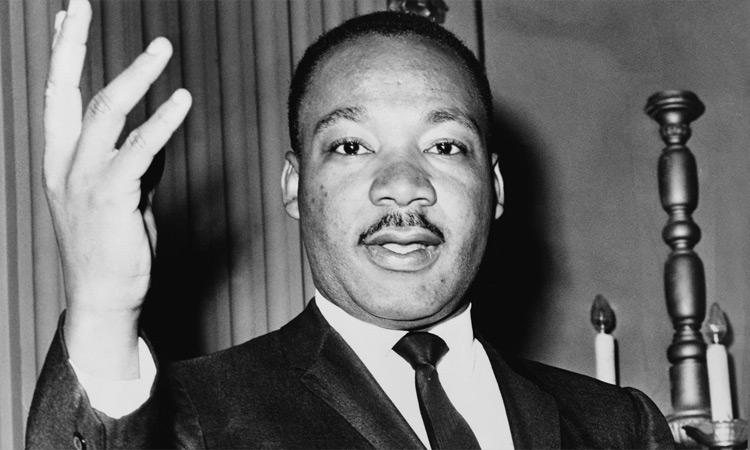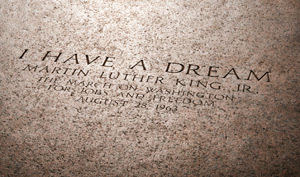 Today we celebrate the life and achievements of Reverend Dr. Martin Luther King Jr., an iconic leader who cultivated his passion for racial and economic equality during the 1960’s and became honorably recognized as one of the greatest public speakers in American history. He turned his outrage about the social injustice of the era into fuel for change. By controlling his feelings and expressing them with such intensity and eloquence, he was able to use his emotional intelligence to develop a strong connection with his audience and convince them to empathize with his cause.
Today we celebrate the life and achievements of Reverend Dr. Martin Luther King Jr., an iconic leader who cultivated his passion for racial and economic equality during the 1960’s and became honorably recognized as one of the greatest public speakers in American history. He turned his outrage about the social injustice of the era into fuel for change. By controlling his feelings and expressing them with such intensity and eloquence, he was able to use his emotional intelligence to develop a strong connection with his audience and convince them to empathize with his cause.
In analyzing his “I Have A Dream” speech, psychologists and educators at the Yale Center for Emotional Intelligence found that Dr. Martin Luther King Jr. used a great deal of strong emotionally charged language, such as “We will not be satisfied until…” He also used aggressive words like “fierce,” “vicious,” “battered,” “despair,” and “crippled.” But he guided his audience through these negative emotions and laid out an emotional roadmap for people to follow.
For instance, he motivated his audience to rise above their current state, “Let us not wallow in the valley of self-despair…” He urged his followers, “We must forever conduct our struggle on the high plane of dignity and discipline.” King inspired his fellow protestors with his words of passion. “We must not allow our creative protest to degenerate into physical violence…again and again, we must rise to the majestic heights of meeting physical force with soul force.”
He encouraged people to rewire their perspectives of harsh times by reminding them that the goal was to unite, not divide. He moved them to a positive emotional state by sharing his vision of equality, using words laced with energy and positivity like “hope,” “justice,” “honor,” “righteousness,” “freedom” and “happiness.” It was his emotional intelligence that inspired people of all backgrounds to join him in taking action.
 As a crowd of 250,000 protestors assembled for the 1963 March on Washington, King delivered the most memorable of all his speeches. Halfway through his dialogue, he deserted his arranged statements and decided to tell the world about his dream. What he did next came from his emotional intelligence and eloquent composition. His words were unscripted, yet historic. King was clearly a man skilled at building upon the emotion of the audience.
As a crowd of 250,000 protestors assembled for the 1963 March on Washington, King delivered the most memorable of all his speeches. Halfway through his dialogue, he deserted his arranged statements and decided to tell the world about his dream. What he did next came from his emotional intelligence and eloquent composition. His words were unscripted, yet historic. King was clearly a man skilled at building upon the emotion of the audience.
In honor of Rev. Dr. Martin Luther King Jr., here are some key points to take from Dr. King’s speeches to help raise your own emotional intelligence.
Avoid critiquing your emotions. Try not to dismiss your feelings before you’ve had time to think them through. If you critique your emotions, you’ll inhibit your ability to fully feel them, making it more difficult to use your emotions in positive ways. Every emotion you have is a new piece of useful information connected to something that’s happening in your world.
Know when enough is enough. There comes a time to stop looking inward and shift your focus outward. Dwelling on negative feelings for a long period of time will only amplify them. Emotional intelligence involves the ability to look within while remaining present in the world around you.
Observe how your emotions and behavior connect. When you feel strongly about something, how do you react? Tune in to your gut responses to situations instead of reacting without reflection. The more you understand what spurs your behavioral impulses, the higher your emotional intelligence will be.
Decide how you will react. You can’t control what you feel, but you can control how you react. If you have a history of lashing out in anger or shutting down, think about how you’d prefer to react next time a similar situation arises.
Improve your empathy skills. Empathy means being able to recognize how other people feel and sharing your emotions with them. Being a more active listener can help you get a better sense of how someone is feeling. When you can use that information to inform your decisions and improve your relationships, that’s building your emotional intelligence.
What made King stand out above the rest was not only that he was heard and understood, but that his listeners felt, through his words, they were also being heard and understood. He connected with his audience by recognizing their suffering and identifying their shared values. He drew from their shared experiences and breathed life into their vision for the future. It was not only the content of Dr. King’s speeches, but also the degree of emotional intelligence they demonstrated that continues to inspire us today.


